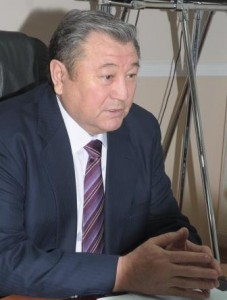 The President’s state-of-the-nation address, “Kazakhstan’s Way – 2050: Common Goals, Common Interests, Common Future” laid out clear steps for building a more competitive state ranked as one of the top 30 most developed countries in the world. President Nursultan Nazarbayev’s address requires the attention of all and is a guide for all power structures.
The President’s state-of-the-nation address, “Kazakhstan’s Way – 2050: Common Goals, Common Interests, Common Future” laid out clear steps for building a more competitive state ranked as one of the top 30 most developed countries in the world. President Nursultan Nazarbayev’s address requires the attention of all and is a guide for all power structures.
The most ambitious notion of the new address is an idea of Mangilik Yel (Eternal Nation) for how to realise the dreams of our ancestors who wanted to see Kazakhstan become a great nation. Our young state started down this path on the first day of independence.
The Commonwealth of Independent States (CIS), Customs Union (CU) and Single Economic Space (SES), which base their activities on a unified legal framework, will serve as catalysts for Kazakhstan’s development. Kazakhstan, Russia and Belarus, in close regional cooperation, are actively working together to promote certain agreed upon joint macroeconomic policies, customs tariff regulations and the protection of national markets.
We have successfully achieved important integration benchmarks, such as the creation of a free trade zone, introduction of a single tariff and the establishment of supranational bodies. The Eurasian Economic Commission of SES is the most effective supranational structure.
Eurasian integration has impressive potential. According to experts, the aggregate volume of the economies of SES participating countries is $2.2 trillion, or 2.6 percent of world GDP. The effect of future integration on GDP growth by 2030 could reach $900 billion. Large scale synchronised actions on the part of the governments of these three countries, the business community, industry and local government are needed for this to happen.
All this increases requirements on the legislative provision of socioeconomic and political processes inside and outside the participating countries. Extensive work on harmonising the three countries’ legislation has already begun. The main task of this process is the creation of a SES legal base.
We have to revise a number of laws and codes, amend bills and adopt new legal acts. Indeed, parliamentarians are facing a difficult task–to provide adequate protection to the interests of Kazakhstan citizens, the society and the whole state during the Eurasian integration. A priority in this context is protection of domestic business within the SES and creation of favourable conditions for domestic entrepreneurs.
Domestic business has already proved its effectiveness in the CU and SES. The volumes of Belarusian and Russian goods increased in the commodity markets. The share of Kazakhstan imports from SES countries in their total volume grew from 32 percent in 2009 to 40 percent in 2012. Mutual trade between Kazakhstan and Russia rose by an average of 7 percent and with Belarus by 10 percent. Moreover, the business climate in the three countries, according to international experts, is gradually improving. The rating of conditions for doing business, as estimated by the World Bank, was raised for CU countries in the bank’s Doing Business 2013 report.
We should also pay special attention to events such as Kazakhstan’s accession to the World Trade Organisation (WTO). At the meeting of the three countries’ leaders in Minsk in the fall of 2013, President Nazarbayev stressed the need for Kazakhstan’s accession to the WTO prior to Eurasian Economic Union beginning operations. This issue is very important because according to the President, the agreements reached can be revised, which in turn will delay Kazakhstan’s accession to the organisation for years. In this regard, it is necessary to harmonise the levels of commitments from Kazakhstan and Russia to that of other WTO members.
There is another important aspect of Eurasian integration which requires detailed consideration. That is, what does it do for ordinary people? Actually, we still forget that all our reforms, reorganisations and management efforts must be based on the interests of ordinary citizens. Our citizens often do not understand what benefits they will reap from the integration process.
Many of our compatriots, who had left for Germany, said that with the formation of the European Union, they obtained the right to visa-free travel to neighbouring countries. All EU countries raised social standards of living, increased the level of remuneration, reduced administrative arbitrariness and enshrined many social achievements in law. Today, this is a powerful incentive to attract new states to the EU. Therefore, ordinary citizens ask: how do we benefit from joining the Eurasian Economic Union and what should we expect in this regard? Even a cursory review of the Kazakhstan media shows that besides the barely understandable macroeconomic forecasts on this issue, there is a lack of information.
Today, we are faced with the task of explaining Eurasian integration to the people of Kazakhstan. Every citizen of the republic must know that his personal income and opportunities will be equal to that of other member states of the Eurasian Economic Union on average. For these reasons as well as others, we need to create a unified legal framework for our system of laws.
The parliamentarians have to do serious work to identify and remove dysfunctional legislation, improve existing laws, harmonise them in accordance with the challenges of our times and develop new bills to ensure legislative activity in the prospective aspect. Actually, a significant portion of work of the two chambers this year will be devoted to the legislative aspects of Eurasian integration.
The author is member of the Senate of the Parliament of Kazakhstan.
